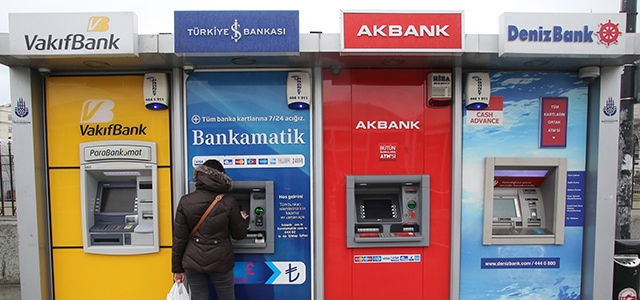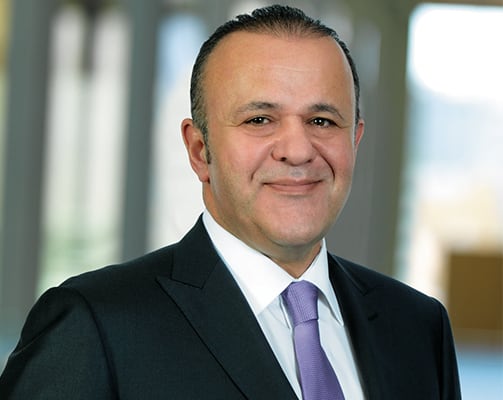COUNTRY REPORT | TURKEY: BANKING

Turkey’s president is not a fan of them, and an increasing tide of regulation and a growing debt profile make for a difficult operating environment for Turkish banks.
Being a banker in Turkey today is no walk in the park. President Recep Tayyip Erdoan has made no secret of his dislike of banks, arguing that they lose no opportunity to profit from the person on the street. Regulation of the country’s banks is getting tighter.
At the start of the year, a series of new laws imposed limitations on fees, reducing from 60 to 20 the number of services for which banks could charge, and curbed installment payments. Banks subsequently reported an 11.5% fall in profits in May to just $4.5 billion, while return on equity that month was 12.8%, a 3% fall against May 2013. The Turkish Bankers Association says sector profits this year will remain flat at around
$11.2 billion, which constitutes a rise of just 5% on 2012. Credit growth is slowing markedly, reflecting the new regulations but also the slowing in domestic demand, yet consumer debt appears to be a growing problem, the first half of 2014 revealing a 22.7% rise, with more than 811,000 people failing to pay credit card and loan debts.
Meanwhile the ratings agencies have the Turkish banking sector in their sights. Fitch Ratings suggesting earlier fast loan growth, insufficient export growth and a rise in external debt have boosted its vulnerability, with the big four Turkish banks (Akbank, Garanti Bank, bank and Yapi Kredi Bank) having to call on central bank reserves to service foreign debts. This echoes what the IMF said earlier this year—that Turkey was the most vulnerable emerging economy because of its combination of high credit growth and current-account deficit.
However Memhet Sami, lead partner for mergers and acquisitions and debt advisory at Deloitte in Istanbul, says that despite a difficult operating environment, Turkey’s banks “are producing good profits and have healthy capital adequacy ratios.” Bankers also seem to be taking things in their stride. “There have been some misuses of fees and commissions by banks, which brought a lot of bad press,” says Hüseyin Özkaya, CEO of Odeabank. “The new regulation will benefit banks, since fees will be regulated, setting the banks free from many lawsuits they are currently facing from customers.”
He adds, however, that although in reality bank fees and commissions in Turkey are just 18.7% of total operating income against a European Union average of 26%, the new playing field resulting from regulation will enable the more efficient banks to attract more customers by charging lower fees.
Özkaya says nonperforming loans are well under control (around 2.6%) and passed a major test over the year to May, with higher interest rates and a depreciating lira only boosting NPLs by some 10 basis points: For the year bank sector NPLs will rise slightly, to around 2.9%, but then stay stable.
Pointing to an improving current-account deficit, Özkaya says it is also important to keep the bank sector’s debt profile in perspective, especially as consumer loan growth has slowed sharply since the new regulations came into force. “The compound annual growth rate of total loans between 2010 and August 2014 has been realized at 24% in nominal terms, which is reasonable for a relatively underbanked emerging markets economy like Turkey.”
Deloitte’s Sami also says fears about rising indebtedness in Turkey have been exaggerated. “Public-debt-to-GDP is less than 40%, and that’s the lowest in Europe; household debt is equivalent to 21%, whilst corporate debt is around 50% of GDP. These are not big numbers.”
“The middle market – SMES – which traditionally have had limited access to finance, will be the new growth area, with business-hungry banks now more keen to go after this business.”
~ Janine Dow, Fitch Ratings
Fitch agrees that the growth in retail loans—many to first-time borrowers, with consumer lending now around 30% to 40% of all lending—should be kept in perspective, in part because it is slowing but also because as Janine Dow, the senior director for financial institutions at Fitch Ratings, admits, “bank management is very astute, particularly in the large banks.”

She argues, however, that consolidation is possible, as some of the smaller of Turkey’s 42 banks may find the new commercial and financial environment too tough and be unable to compete with banks with a broader customer base and larger economies of scale. She believes there will be a shift away from consumer lending.
“The middle market—SMEs—which traditionally have had limited access to finance, will be the new growth area, with business-hungry banks now more keen to go after this business, possibly unsecured and over the long term,” she says.
The big question for Turkey going forward, however, is whether its banks can continue financing the government’s ambitious infrastructure plans. According to Deloitte’s Sami, the banks—and the Turkish state, through the issuance of bonds—have financed the lion’s share of projects to date, foreign banks having generally been preoccupied with issues in their home markets. Is this trend likely to continue? The lower deficit has freed banks from having to lend so much to the state, which has meant they have more capital available to put into large infrastructure projects. And the shift away from consumer loans should also free capacity.
“In the short term, banks shouldn’t have any problem financing ongoing infrastructure projects; beyond that, we’ll have to see how it goes,” says Sami. “But there are lots of new financing techniques, like public-private partnership (which is financing healthcare campuses and other projects), and these will be increasingly important going forward.”
Turkey and its banks remain dependent on external financing. Just how much so depends on the success the country has in achieving its most important economic objectives—reducing the current-account deficit, boosting domestic savings from its current low level of around 12% and, of course, sustaining growth.
“To achieve sustained and faster growth, Turkey needs to increase domestic investment and productive capacity,” says Neil Shearing, chief emerging markets economist at Capital Economics. “But in the current political climate—with parliamentary elections next June—the necessary but unpopular reforms needed for this look unlikely.”



